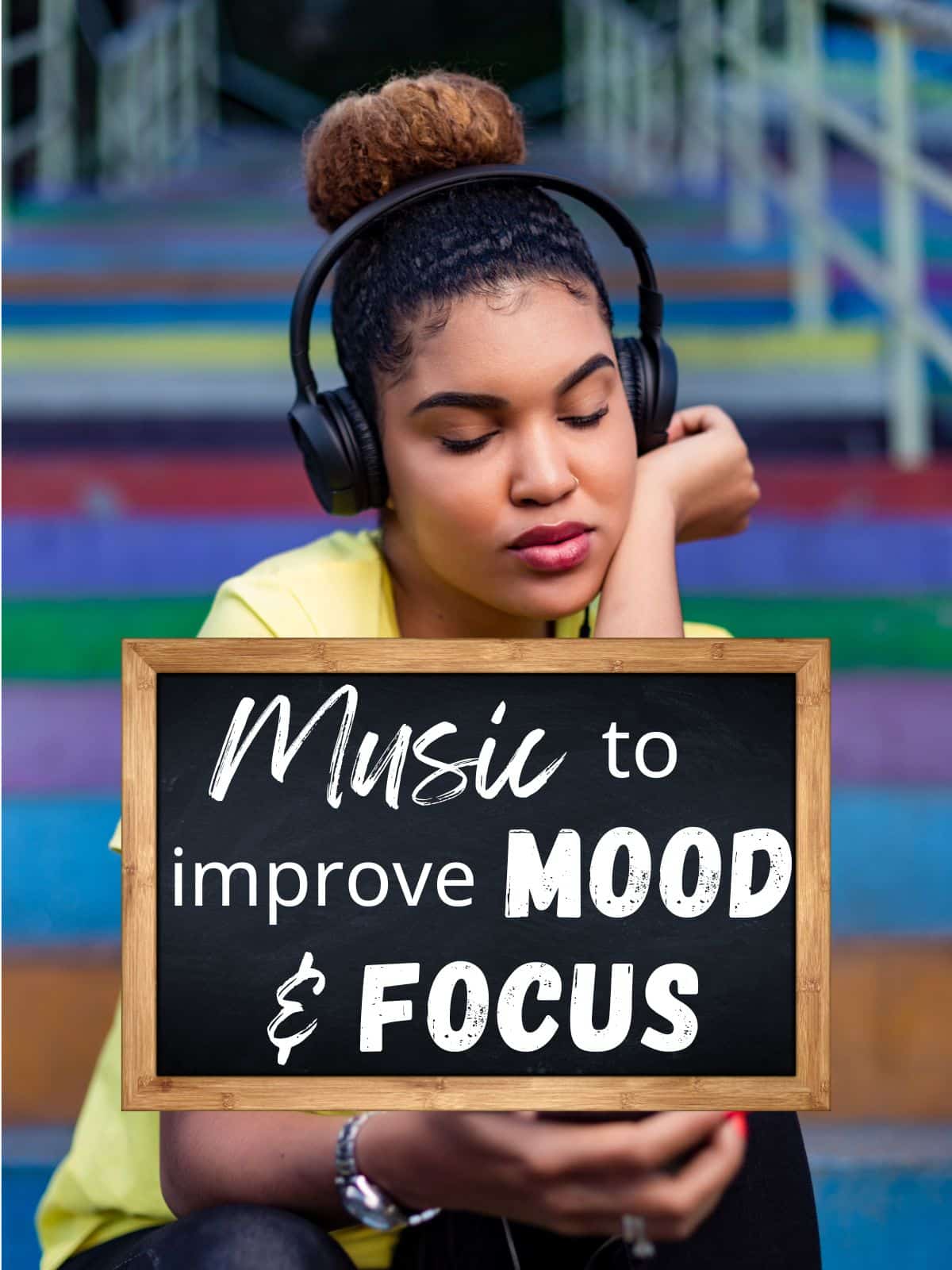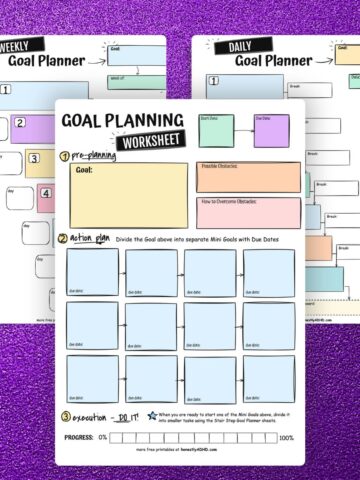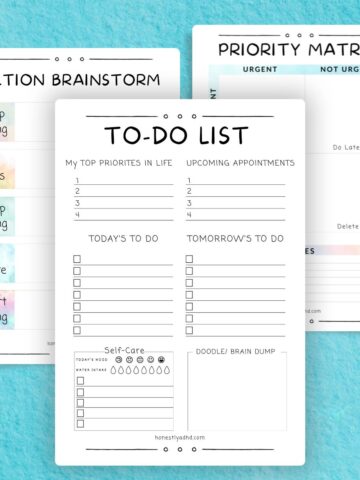The content on this website is for informational purposes only and is not meant to replace professional or medical advice. See our full disclaimer.
Have you ever wondered how the symphony of sound - its lyrics, rhythms, and beats, could be a lifesaver for those with ADHD (Attention Deficit Hyperactivity Disorder)?
As counter-intuitive as it may seem, music, with all its complexity, can be an effective tool to improve focus and manage ADHD symptoms.
Let's delve into this fascinating interplay of music and the ADHD brain.
Jump to:
How Music Benefits the ADHD Brain
Music is like an emotional conductor for our ADHD brains. It influences our mood, regulates our emotions, and even modifies our behavior.
When we listen to music, our amygdala (the emotional powerhouse of our brain) processes the notes, rhythm, and tempo, translating them into emotional responses and behaviors.1Fernández-Sotos, A., Fernández-Caballero, A., & Latorre, J. M. (2016). Influence of Tempo and Rhythmic Unit in Musical Emotion Regulation. Frontiers in Computational Neuroscience, 10, 80. https://doi.org/10.3389/fncom.2016.00080
Interestingly, for an ADHD brain, background music serves as an additional stimulation that helps focus on the primary task at hand.
This might seem odd to neurotypical individuals, but for people with ADHD, music boosts executive function and cognitive performance.2Garcia-Argibay, M., Santed, M. A., & Reales, J. M. (2019). Binaural auditory beats affect long-term memory. Psychological Research, 83(6), 1124–1136. https://doi.org/10.1007/s00426-017-0959-2 That means music can help us with focus and getting things done.
Researchers have found that individuals with ADHD solve more mathematical problems correctly while listening to music compared to their neurotypical counterparts in a quiet environment. It seems that background music boosts cognition, memory, and learning.
However, be mindful of the type of background music—it should be free of loud and distracting lyrics.3Koelsch, S. (2014). Brain correlates of music-evoked emotions. Nature Reviews Neuroscience, 15(3), 170–180. https://doi.org/10.1038/nrn3666
Music and Emotional Well-being
ADHD is not a solitary condition—it often travels with emotional companions such as depression and anxiety. The functional impairments caused by ADHD can reduce the quality of life, leading to stress and depression.
Here's where the magic of music comes into play. Music not only improves cognitive and sensory functions but also boosts self-esteem and alleviates feelings of hopelessness and sadness.
It can have a calming effect on the ADHD mind, reducing stress caused by hyperactivity, disorganization, and difficulty in task management. Plus, music generates responses in the limbic system, which helps regulate blood pressure, heart rate, and respiratory rate, thereby relieving psychological stress.
ADHD Music for Concentration
As Brit Barkholtz wisely pointed out, "Music can be really helpful for people with ADHD because it can provide a singular background noise rather than twenty."
If you struggle to study in silence, music can be your new best friend. It can help you stay focused, improve productivity, and make the task more enjoyable.
Listening to music improves cognitive and sensory movements, restores self-esteem, and reduces hopelessness and sadness.
Additionally, a stable rhythm can calm your ADHD mind and stress generated by hyperactivity, disorganization, mismanagement, and difficulty planning and accomplishing tasks.4Särkämö, T., Tervaniemi, M., Laitinen, S., Forsblom, A., Soinila, S., Mikkonen, M., ... & Hietanen, M. (2008). Music listening enhances cognitive recovery and mood after a middle cerebral artery stroke. Brain, 131(3), 866-876. https://doi.org/10.1093/brain/awn013
Choosing the Right Music
There is a large variety of music to consider, especially when it comes to enhancing focus and concentration. Classical music has been found to shift the "electromagnetic frequency" of brain waves, leading to improved focus and concentration.5Thompson, W. F., Schellenberg, E. G., & Husain, G. (2001). Arousal, mood, and the Mozart effect. Psychological Science, 12(3), 248-251. https://doi.org/10.1111/1467-9280.00345
According to a study, listening to classical music for 20 minutes per day strengthens the organization of the brain and memory. It also improves speech and language skills.6Lozanov, G. (1978). Suggestology and Outlines of Suggestopedy. Gordon & Breach.
So, if you are a fan of Vivaldi, Mozart, Bach, or Handel, their compositions might be your key to productivity. But if lyrics are too distracting, consider low-volume electronic music.
White noise might be a helpful alternative for those who struggle with attention and task performance. It's a mix of different frequencies and has been found to improve task performance in individuals with ADHD.7Söderlund, G., Sikström, S., & Smart, A. (2007). Listen to the noise: Noise is beneficial for cognitive performance in ADHD. Journal of Child Psychology and Psychiatry, 48(8), 840-847. https://doi.org/10.1111/j.1469-7610.2007.01749.x
Another intriguing form of sound therapy is binaural beats therapy. It involves listening to two slightly different frequencies in each ear, which can reduce inattention, increase calmness, and improve concentration.8Garcia-Argibay, M., Santed, M. A., & Reales, J. M. (2019). Binaural auditory beats affect long-term memory. Psychological Research, 83(6), 1124–1136. https://doi.org/10.1007/s00426-017-0959-2
To make the most of music's benefits, here are some quick tips:
- Create separate playlists for different tasks.
- Avoid loud, heavy music without a steady rhythm.
- Steer clear of songs with distracting lyrics.
- Avoid radios and TV, or opt for commercial-free stations.
- Use music intentionally. Don't overuse it, or it might lose its effectiveness.
Music Therapy for ADHD
If music resonates with you, consider exploring music therapy. It's a therapeutic approach that uses music to evoke responses of relaxation, enthusiasm, satisfaction, self-confidence, and alertness.
This treatment can help address emotional, cognitive, and developmental needs. It can potentially alleviate symptoms of co-occurring mental health conditions such as depression, learning disorders, tic disorder, adjustment disorder, ODD, and CD.
Music therapy involves a lot more than just listening to music. It can also involve writing, singing, recreating music, improvising songs, and playing musical instruments. It's best to experiment and see what resonates with you.9Habibi, A., & Damasio, A. (2014). Music, feelings, and the human brain. Psychomusicology: Music, Mind, and Brain, 24(1), 92–102. https://doi.org/10.1037/pmu0000033
According to ADHD expert William Schroeder, LPC, NCC, "Music enhances parts of the brain that are weak in ADHD children. The auditory, visual/spatial, and motor cortices of the brain are all strengthened by music. These areas are linked to speech and language abilities, reading comprehension, math, problem-solving, brain organization, focus, and attention issues."
Your Focus Music
Music isn't a one-size-fits-all solution, and what works for one person in regards to their music choices might not work for another. So, explore, experiment, and find the tunes that sync perfectly with the unique rhythm of your ADHD mind.
It can be a trusted ally in your journey towards managing ADHD. With the right melodies, rhythms, and volumes, you may find that music hits the right notes, helping you stay focused, calm, and in control.
References:
- 1Fernández-Sotos, A., Fernández-Caballero, A., & Latorre, J. M. (2016). Influence of Tempo and Rhythmic Unit in Musical Emotion Regulation. Frontiers in Computational Neuroscience, 10, 80. https://doi.org/10.3389/fncom.2016.00080
- 2Garcia-Argibay, M., Santed, M. A., & Reales, J. M. (2019). Binaural auditory beats affect long-term memory. Psychological Research, 83(6), 1124–1136. https://doi.org/10.1007/s00426-017-0959-2
- 3Koelsch, S. (2014). Brain correlates of music-evoked emotions. Nature Reviews Neuroscience, 15(3), 170–180. https://doi.org/10.1038/nrn3666
- 4Särkämö, T., Tervaniemi, M., Laitinen, S., Forsblom, A., Soinila, S., Mikkonen, M., ... & Hietanen, M. (2008). Music listening enhances cognitive recovery and mood after a middle cerebral artery stroke. Brain, 131(3), 866-876. https://doi.org/10.1093/brain/awn013
- 5Thompson, W. F., Schellenberg, E. G., & Husain, G. (2001). Arousal, mood, and the Mozart effect. Psychological Science, 12(3), 248-251. https://doi.org/10.1111/1467-9280.00345
- 6Lozanov, G. (1978). Suggestology and Outlines of Suggestopedy. Gordon & Breach.
- 7Söderlund, G., Sikström, S., & Smart, A. (2007). Listen to the noise: Noise is beneficial for cognitive performance in ADHD. Journal of Child Psychology and Psychiatry, 48(8), 840-847. https://doi.org/10.1111/j.1469-7610.2007.01749.x
- 8Garcia-Argibay, M., Santed, M. A., & Reales, J. M. (2019). Binaural auditory beats affect long-term memory. Psychological Research, 83(6), 1124–1136. https://doi.org/10.1007/s00426-017-0959-2
- 9Habibi, A., & Damasio, A. (2014). Music, feelings, and the human brain. Psychomusicology: Music, Mind, and Brain, 24(1), 92–102. https://doi.org/10.1037/pmu0000033






We'd love to hear from you